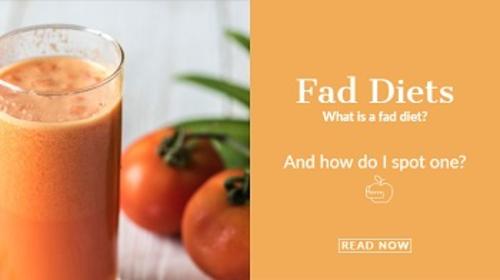
When someone offers a faster, easier way of doing something, most people are only too excited to jump on the bandwagon. Email has virtually replaced the need to ever send a letter, online shopping means less trips to crowded stores, and meal delivery kits take the guesswork out of dinner.
Fad diets are no different. Sure we can probably improve our health and lose weight by planning meals, making good food choices, and going the gym regularly. But all of that requires patience, dedication and time commitment. And that is a lot to ask of the typical over-booked North American adult. It’s much easier to sign ourselves up for a program, cross our fingers and hope it works.
Most people who turn towards diets have good intentions—wanting to feel or look better, and reduce health risks like diabetes or heart disease. Companies that promote fad diets take advantage of our positive intentions and leave us absent of a long term solution.
Fad diets can save us time and offer convenience, but that isn’t the only reason they’re so appealing. One benefit a diet program can offer is structure. We make so many choices every single day that decision fatigue is inevitable. When it comes to food alone, we make over 200 decisions every single day. That’s 1400 food decisions in a week, and over 70,000 in a year. Overwhelming yet?
For many, having regime that dictates or limits the decisions we have to make when it comes to food can be a relief—it’s one less thing to think about. In addition to structure, many diet programs also offer accountability. This can be through group forums, a regular check-in, or simply through logging foods and counting nutrients. Accountability provides the support we need to succeed in our nutrition goals.
Convenience, structure and accountability. Doesn’t sound so bad, huh? So what’s so wrong with a fad diet then? Fad diets are missing a few critical elements of a healthy lifestyle. They lack evidence based research to back up their claims, and can even increase health risks or lead to serious nutrition deficiencies. Fad diets also can be gateways to long term disordered eating patterns, yo-yo dieting and body image distress. Most importantly, they are not sustainable. Any diet that restricts foods, entire food groups, or proposes unrealistic macronutrient intakes is neither healthy nor realistic in the long run.
So how do you achieve success? Slow and steady wins the race after all. It comes right back down to patience, dedication and a time commitment towards a balanced eating and activity regime. That doesn’t mean you have to jump in feet first though. Remember, change takes time and building healthy habits is hard. Start with one small goal, and build on from there. Maybe it’s as simple as making water your drink of choice, or signing up for a yoga class once. Health is a journey, not a destination. That means no diet, detox or supplement is going to get us there any faster.
Stay tuned for next month: True or False? Debunking the most common food myths I hear as a dietitian.
Have questions about food trends, eating well or nutrition on campus? Our UW Dietitian has answers! Email Nicole at nicole.pin@uwaterloo.ca.





